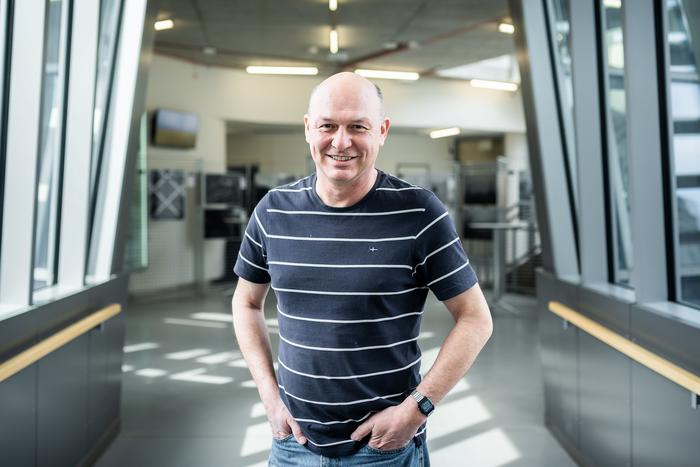
Recent advancements in the field of biomedical research have brought a promising new treatment for an autoimmune disorder known as alopecia areata, which causes significant hair loss and affects approximately 2% of the population, with a majority among women. This breakthrough comes from a collaborative effort led by Dr. Pavel Majer from the Institute of Organic Chemistry and Biochemistry in Prague, along with teams from esteemed institutions such as Johns Hopkins University. Their research, published in the high-impact Journal of Medicinal Chemistry, presents an innovative series of prodrugs derived from itaconic acid that could revolutionize treatment approaches to this distressing condition.
Alopecia areata arises when the immune system mistakenly targets hair follicles, resulting in inflammation and subsequent hair loss. Current treatment options are largely centered around corticosteroids, which while effective can also lead to bothersome side effects. The scientists’ new approach with itaconate derivatives offers a novel mechanism that addresses underlying inflammation without the associated risks typical of steroid treatments. The efficacy of their research has garnered attention, indicating a significant step forward in drug discovery and development for alopecia areata.
The study reveals how their developed prodrugs not only alleviate symptoms but also exhibit properties that encourage hair regrowth. Among the compounds studied, SCD-153 has shown particular promise; pre-clinical testing demonstrated its capability to not only reduce inflammation but also activate dormant hair follicles, promoting new hair growth. This transformation of hair follicles from a resting phase to an active growth phase is critical, offering a pathway to restoring hair for individuals afflicted with alopecia areata.
One of the challenges faced by researchers in developing effective therapies is ensuring that active substances can penetrate cell membranes efficiently. The naturally occurring itaconate presents this barrier, limiting its effectiveness. Dr. Majer’s team ingeniously developed a solution in the form of prodrugs that can be metabolized into their active forms within the body. By creating derivatives that can bypass the cell membrane, they have opened the door to effective oral administration rather than relying solely on topical treatments.
Clinical findings have shown that these compounds demonstrate a favorable absorption profile when tested in animal models. This suggests that further development could focus on creating oral formulations, which are generally more convenient for patients than creams or ointments. The versatility of being administrable as tablets can greatly enhance patient compliance and therapeutic outcomes, marking a significant advancement in drug delivery systems related to autoimmune treatment.
The implications of this research extend beyond alopecia areata, as the principles of using itaconate-type prodrugs may have applications in various inflammatory conditions driven by immune dysregulation. As scientists gain greater understanding of the biochemical pathways involved in such disorders, new avenues for therapeutic intervention may be explored, paving the way for broader applications of this technology.
Pharmaceutical company SPARC has taken notice of these developments, acquiring licensing rights to utilize the patented technology surrounding the itaconate prodrugs. Their commitment to bringing the compound SCD-153 into clinical trials marks a crucial step towards making this potential treatment accessible to patients. Currently, they are recruiting individuals for phase 1 trials, a pivotal stage in establishing safety and efficacy in humans.
The hope is that these clinical trials will yield positive outcomes, leading to a new standard of care for those suffering from alopecia areata. The existing treatments could soon be complemented or replaced by this innovative approach, significantly improving the quality of life for patients who often endure emotional and psychological distress due to hair loss.
The research team’s ongoing focus on interdisciplinary collaboration exemplifies the growing trend where different scientific fields converge to solve complex health issues. The successful integration of chemistry, biochemistry, and clinical research not only enhances the immediate prospects for alopecia treatment but also sets a precedent for future research in other autoimmune disorders.
In conclusion, the work spearheaded by Dr. Majer and his collaborators heralds a new era in the treatment of alopecia areata, embodying the principles of precision medicine. The promising data from these studies reflects a commitment to innovation that is essential for addressing chronic conditions that impact so many lives. As this research progresses towards clinical application, it stands not only to change how alopecia is treated but also to inspire future developments in therapeutic interventions across a spectrum of inflammatory diseases.
As we await further developments from clinical trials, the scientific community remains optimistic about the possibility of relief for many who suffer from the anxiety of autoimmune disorders. The meticulous research and strategic partnerships that have driven this advancement provide a beacon of hope in the ever-evolving landscape of modern medicine.
Subject of Research: Development of prodrugs for the treatment of alopecia areata
Article Title: Discovery of Orally Available Prodrugs of Itaconate and Derivatives
News Publication Date: 23-Jan-2025
Web References: DOI Link
References: Lee, C. B., Šnajdr, I., Tenora, L., Alt, J., Gori, S., Krečmerová, M., Maragakis, R. M., Paule, J., Tiwari, S., Iyer, J., Talwar, R., Garza, L., Majer, P., Slusher, B. S., & Rais, R. Discovery of Orally Available Prodrugs of Itaconate and Derivatives.
Image Credits: Photo: Tomáš Belloň/IOCB Prague
Keywords: Alopecia areata, Autoimmune disorders, Itaconate derivatives, Drug discovery, Pharmaceutical advancements, Prodrugs, Hair loss treatment, Immunology, Precision medicine, Clinical trials, Drug delivery systems, Biochemical research.
Tags: alopecia areata researchautoimmune hair loss treatmentbiomedical research breakthroughscorticosteroid alternativesDr. Pavel Majerhair regrowth therapiesinflammation and hair lossinnovative drug developmentInstitute of Organic Chemistry and Biochemistryitaconic acid prodrugsJournal of Medicinal Chemistrywomen’s health and hair loss





